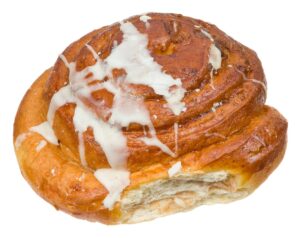
Image by Evan-Amos, Wikipedia Commons
If you have ever been truly poor (or a soldier or mountain man), you understand that having potable water, edible food, immediate physical safety, lifegiving medicine, heat in the winter, and basic hygiene of body/clothes/housing (including an absence of vermin), are what matter. There is, in fact, a relief in knowing what the basics are, in case things go bad (again) and you need to start over.
Next level? Plumbing and fixtures that work properly. A refrigerator. A stove. Pots and utensils, and a way to wash them well. Electric lights. A bed of your own as a kid. The absence of discomfort, let alone pain from, say, untended teeth.
And after that? The security to keep a few personal things—library books, a teddy bear. Plates and cups. An oven, which is the luxury after a stove. Some mobility, even if that means a good pair of walking shoes. Some privacy. Someone on your side. A home you are not ashamed to bring someone back to. The dignity of personal appearance. Some form of diversion or entertainment.
Beyond those basics, which are markers of poverty by their absence, there are the things we might say have to do with “class.”
A Facebook friend posted a meme the other day: “My wife grew up thinking that having water/ice dispensers IN THE FRIDGE DOOR was a life goal. I grew up thinking if you had a basketball hoop with a clear/plexiglass backboard, you were rich. What were some things you thought were indicators of wealth when you were a kid?”
I agree with those, though technology has changed what it means to really live it up. I do not think there were water and ice dispensers in my day. Then again, I did not think people had air-conditioning in their homes.
Commenters’ indicators of wealth are very touching—and true:
Nice (or different types of) furniture, cable TV, a pool at the house, “massive amounts of wealth,” clothes that were in style, name-brand clothing, a cell phone, flying in a plane, vacation home, “2 separate living rooms…one for show and one to use.”
Disney vacation, “taking a friend on vacation,” “curved staircase, grandfather clock, fancy chandelier,” “soccer/dance/gymnastics,” videogame consoles, “yearbook every year, L.L. Bean backpack, cookie cutter neighborhood, van or SUV…Nutrigrain bars.”
Snacks in general, carpeting, leased or new cars, second car, a boat, more than one bathing suit in a summer, finished basements, “one of those 2nd floors that overlooked the living room,” a dishwasher.
A lunch sandwich wrapped in foil instead of waxed paper, sleepaway camp, Caller ID, a separate videotape rewinder, owning horses, private lessons for anything, a birthday party every year, double-wide in a trailer park (instead of stand-alone single-wide), having a garage, six-panel doors and closets, sprinkler system for the yard, second bathroom, second phone line, a two-story house.
“One of those awesome swing sets with the like fort in it. […] Getting your hair and nails done. Mom and dad buying you a car. Getting a limo for homecoming. A house on the lake. And parents who when you went over they didn’t bug you and let you do your own thing.”
“An orange.”
Alec Baldwin, in an episode of Comedians in Cars Getting Coffee, tells Jerry Seinfeld that his thing was the Slip ‘N Slide. He pretends to be a kid again, jealous that Seinfeld, who grew up in his town, had one: “Whoa, that…Jerry got a…Slip ‘N Slide. That hard-on. Look at that Slip ‘N Slide. Can you imagine? Jeez. Is anybody out here using it? Is anybody playing with it? He’s in the house. What’s he doing? Look through the window! He’s talking into a hairbrush in his bathroom!”
Dave Chappelle (“My parents did just well enough so I could grow up poor around white people”) lusted for Stove Top Stuffing.
Then there’s the explosion of joy when “We goin’ Sizzler.”
For me, there was a new awareness when I found food made regularly with fresh ingredients. The smell of a garlic clove cut in two and rubbed on fresh bread, with leaf basil, sliced tomato, good olive oil, and buffalo mozzarella.
My childhood diet was not all Spam and chow mein in a tall can with fried noodles in a separate can on top. People in my town grew their own tomatoes, peppers, and zucchini more frequently then. But there is no doubt that even the sweet smell of refrigerated cinnamon rolls baking in an oven was as exotic to me as Phở Gà in a Danang soup-seller’s stall. Both delight me still.
What is still the sweet smell of success to you?
